裕兴新概念英语第二册笔记 第65课
- 格式:doc
- 大小:47.50 KB
- 文档页数:5
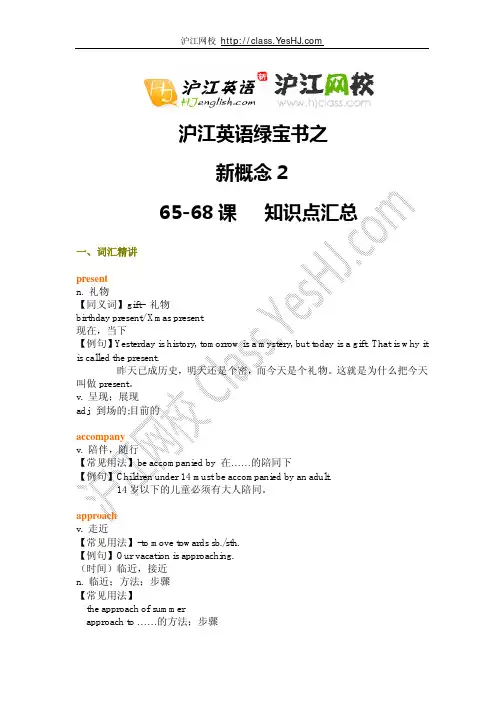
沪江英语绿宝书之新概念265-68课知识点汇总一、词汇精讲presentn. 礼物【同义词】gift- 礼物birthday present/ Xmas present现在,当下【例句】Yesterday is history, tomorrow is a mystery, but today is a gift. That is why it is called the present.昨天已成历史,明天还是个密,而今天是个礼物。
这就是为什么把今天叫做present。
v. 呈现;展现adj. 到场的;目前的accompanyv. 陪伴,随行【常见用法】be accompanied by 在……的陪同下【例句】Children under 14 must be accompanied by an adult.14岁以下的儿童必须有大人陪同。
approachv. 走近【常见用法】-to move towards sb./sth.【例句】Our vacation is approaching.(时间)临近,接近n. 临近;方法;步骤【常见用法】the approach of summerapproach to ……的方法;步骤oughtv. 应该;有可能【常见用法】-oughtn’t-ought to do sth.【例句】We ought to leave at once.我们应该马上离开。
weighv. 重【例句】-How much do you weigh?你多重?【常见用法】-weigh a ton: very heavy-weigh sth.↔out 称出重量-weigh sb./sth.↔upweigh up the pros and cons 权衡利弊n.重量fortunateadj. 幸运的【常见用法】fortunate to do sth.【例句】I’m fortunate to have such supportive parents.我很幸运有支持我的父母。
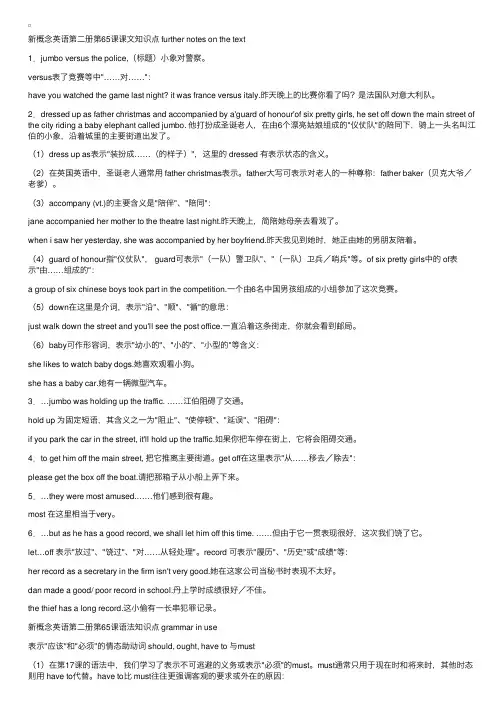
新概念英语第⼆册第65课课⽂知识点 further notes on the text1.jumbo versus the police,(标题)⼩象对警察。
versus表了竞赛等中"……对……":have you watched the game last night? it was france versus italy.昨天晚上的⽐赛你看了吗?是法国队对意⼤利队。
2.dressed up as father christmas and accompanied by a'guard of honour'of six pretty girls, he set off down the main street of the city riding a baby elephant called jumbo. 他打扮成圣诞⽼⼈,在由6个漂亮姑娘组成的"仪仗队"的陪同下,骑上⼀头名叫江伯的⼩象,沿着城⾥的主要街道出发了。
(1)dress up as表⽰"装扮成……(的样⼦)",这⾥的 dressed 有表⽰状态的含义。
(2)在英国英语中,圣诞⽼⼈通常⽤ father christmas表⽰。
father⼤写可表⽰对⽼⼈的⼀种尊称:father baker(贝克⼤爷/⽼爹)。
(3)accompany (vt.)的主要含义是"陪伴"、"陪同":jane accompanied her mother to the theatre last night.昨天晚上,简陪她母亲去看戏了。
when i saw her yesterday, she was accompanied by her boyfriend.昨天我见到她时,她正由她的男朋友陪着。
(4)guard of honour指"仪仗队", guard可表⽰"(⼀队)警卫队"、"(⼀队)卫兵/哨兵"等。
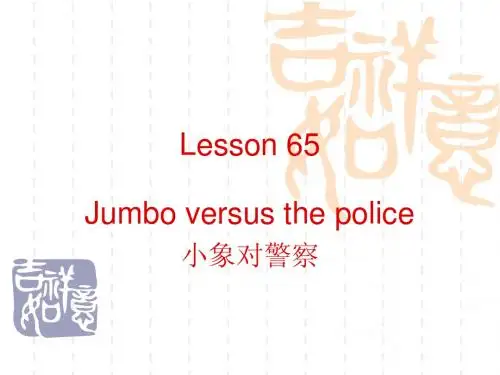
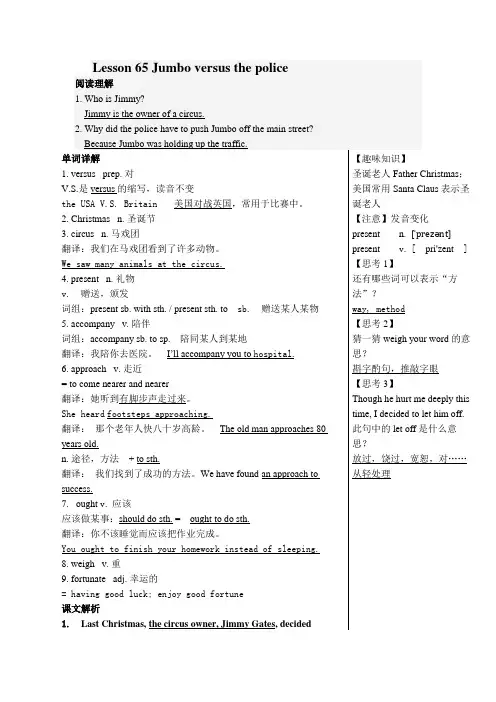
totake some presents to a children’s hospital.●∙语法:第一个横线处二者是同位语关系●∙词组:take sth. to sb. = take sb. sth.2. Dressed up as Father Christmas and accompanied by a ‘guard of honour’of six pretty girls, he set off down the main street of the city riding a baby elephant called Jumbo.●∙词组:sb. be dress ed up as…装扮成为……(的样子)此处为过去分词●∙语法:riding a baby elephant 为现在分词作状语(详见语法重点)●∙词组:a guard of honour 仪仗队●∙单词:of six pretty girls中的of表示“由……组成的”翻译:一个由六个中国男孩子组成的队伍参加了此次比赛。
A group of six Chinese boys took part in the competition.●∙词组:set off 出发e.g. We set off for London just after ten.3. He should have known that the police would never allow this sort of thing.●∙语法:should have done/ ought to have done 表示原本应该做而实际没做翻译:你应该早点儿来。
You should have come earlier.在玩之前你应该先完成工作的。
You ought to have finished your work before playing.4. A policeman approached Jimmy and told him he ought to have gone along a side street as Jumbo was holding up the traffic.●∙单词:as=because●∙词组:hold up(1) 阻碍交通e.g. If you park the car in the street, it’ll hold up the traffic.(2) 支持住,承受住e.g. She is holding up well under the pressure.5. Though Jimmy agreed to go at once, Jumbo refused to move.●∙词组:agree to do sth. 同意做某事扩展:agree with sb.同意某人(的建议等)6. Fifteen policemen had to push very hard to get him off the main street.●∙词组:get sth. off sp.从……移去/除去翻译:请把箱子从船里拿走。
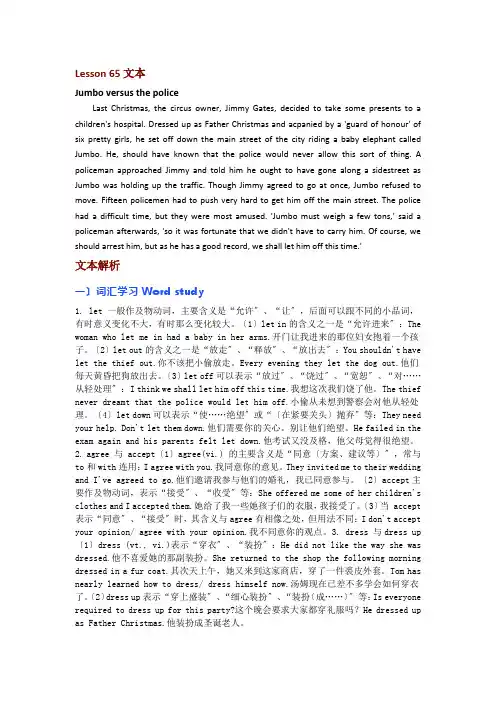
Lesson 65 文本Jumbo versus the policeLast Christmas, the circus owner, Jimmy Gates, decided to take some presents to a children's hospital. Dressed up as Father Christmas and acpanied by a 'guard of honour' of six pretty girls, he set off down the main street of the city riding a baby elephant called Jumbo. He, should have known that the police would never allow this sort of thing. A policeman approached Jimmy and told him he ought to have gone along a sidestreet as Jumbo was holding up the traffic. Though Jimmy agreed to go at once, Jumbo refused to move. Fifteen policemen had to push very hard to get him off the main street. The police had a difficult time, but they were most amused. 'Jumbo must weigh a few tons,' said a policeman afterwards, 'so it was fortunate that we didn't have to carry him. Of course, we should arrest him, but as he has a good record, we shall let him off this time.'文本解析一〕词汇学习Word study1. let 一般作及物动词,主要含义是“允许〞、“让〞,后面可以跟不同的小品词,有时意义变化不大,有时那么变化较大。
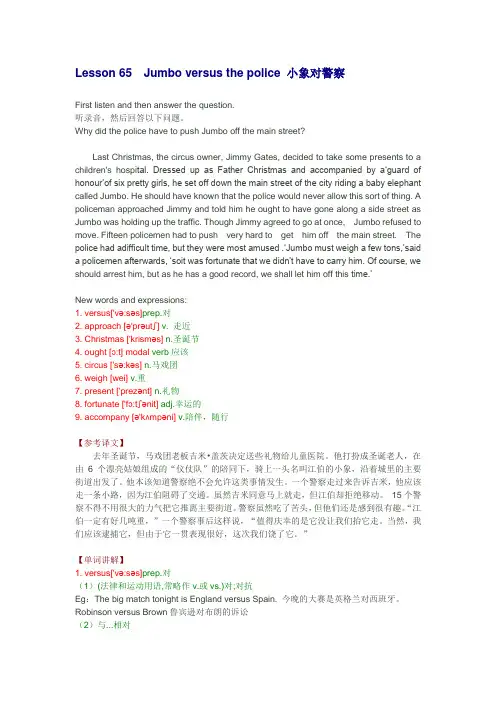
Lesson 65 Jumbo versus the police 小象对警察First listen and then answer the question.听录音,然后回答以下问题。
Why did the police have to push Jumbo off the main street?Last Christmas, the circus owner, Jimmy Gates, decided to take some presents to a children's hosp ital. Dressed up as Father Christmas and accompanied by a‘guard of honour’of six pretty girls, he set off down the main street of the city riding a baby elephant called Jumbo. He should have known that the police would never allow this sort of thing. A policeman approached Jimmy and told him he ought to have gone along a side street as Jumbo was holding up the traffic. Though Jimmy agreed to go at once, Jumbo refused to move. Fifteen policemen had to push very hard to get him off the main street. The police had adifficult time, but they were most amused .‘Jumbo must weigh a few tons,’said a policemen afterwards, ‘soit was fortunate that we didn't have to carry him. Of course, we should arrest him, but as he has a good record, we shall let him off this time.’New words and expressions:1. versus['və:səs]prep.对2. approach [ə'prəutʃ] v. 走近3. Christmas ['krisməs] n.圣诞节4. ought [ɔ:t] modal verb应该5. circus ['sə:kəs] n.马戏团6. weigh [wei] v.重7. present ['prezənt] n.礼物8. fortunate ['fɔ:tʃənit] adj.幸运的9. accompany [ə'kʌmpəni] v.陪伴,随行【参考译文】去年圣诞节,马戏团老板吉米•盖茨决定送些礼物给儿童医院。
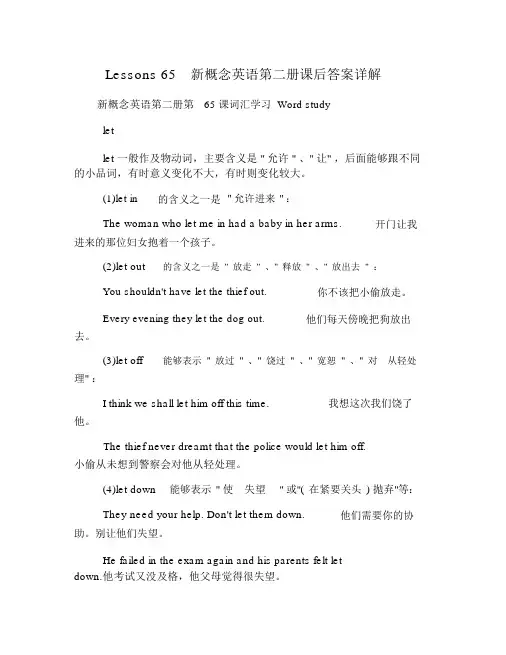
Lessons 65新概念英语第二册课后答案详解新概念英语第二册第65 课词汇学习 Word studyletlet 一般作及物动词,主要含义是 " 允许 " 、" 让" ,后面能够跟不同的小品词,有时意义变化不大,有时则变化较大。
(1)let in 的含义之一是" 允许进来" :The woman who let me in had a baby in her arms. 开门让我进来的那位妇女抱着一个孩子。
(2)let out的含义之一是"放走"、"释放"、"放出去":You shouldn't have let the thief out. 你不该把小偷放走。
Every evening they let the dog out. 他们每天傍晚把狗放出去。
(3)let off能够表示"放过"、"饶过"、"宽恕"、"对从轻处理" :I think we shall let him off this time.我想这次我们饶了他。
The thief never dreamt that the police would let him off.小偷从未想到警察会对他从轻处理。
(4)let down 能够表示" 使失望" 或"( 在紧要关头) 抛弃"等:They need your help. Don't let them down. 他们需要你的协助。
别让他们失望。
He failed in the exam again and his parents felt letdown.他考试又没及格,他父母觉得很失望。
agree 与 accept(1)agree(vi.)的主要含义是"同意(计划、建议等)",常与to和 with 连用:I agree with you.我同意你的意见。
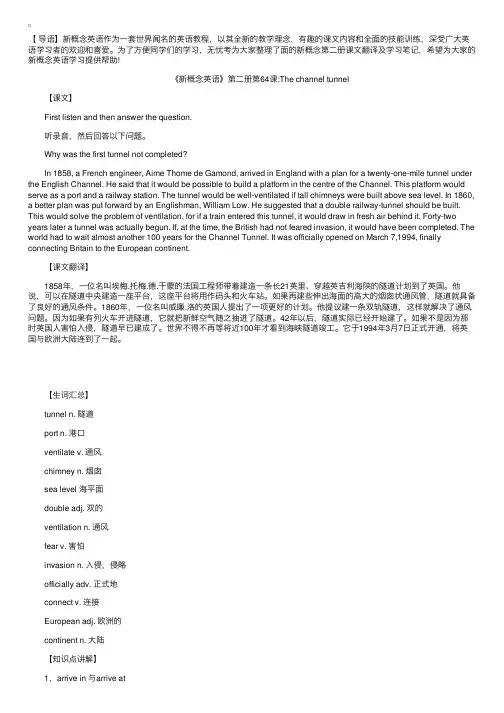
【导语】新概念英语作为⼀套世界闻名的英语教程,以其全新的教学理念,有趣的课⽂内容和全⾯的技能训练,深受⼴⼤英语学习者的欢迎和喜爱。
为了⽅便同学们的学习,⽆忧考为⼤家整理了⾯的新概念第⼆册课⽂翻译及学习笔记,希望为⼤家的新概念英语学习提供帮助!《新概念英语》第⼆册第64课:The channel tunnel【课⽂】First listen and then answer the question.听录⾳,然后回答以下问题。
Why was the first tunnel not completed?In 1858, a French engineer, Aime Thome de Gamond, arrived in England with a plan for a twenty-one-mile tunnel under the English Channel. He said that it would be possible to build a platform in the centre of the Channel. This platform would serve as a port and a railway station. The tunnel would be well-ventilated if tall chimneys were built above sea level. In 1860, a better plan was put forward by an Englishman, William Low. He suggested that a double railway-tunnel should be built. This would solve the problem of ventilation, for if a train entered this tunnel, it would draw in fresh air behind it. Forty-two years later a tunnel was actually begun. If, at the time, the British had not feared invasion, it would have been completed. The world had to wait almost another 100 years for the Channel Tunnel. It was officially opened on March 7,1994, finally connecting Britain to the European continent.【课⽂翻译】1858年,⼀位名叫埃梅.托梅.德.⼲蒙的法国⼯程师带着建造⼀条长21英⾥、穿越英吉利海陕的隧道计划到了英国。
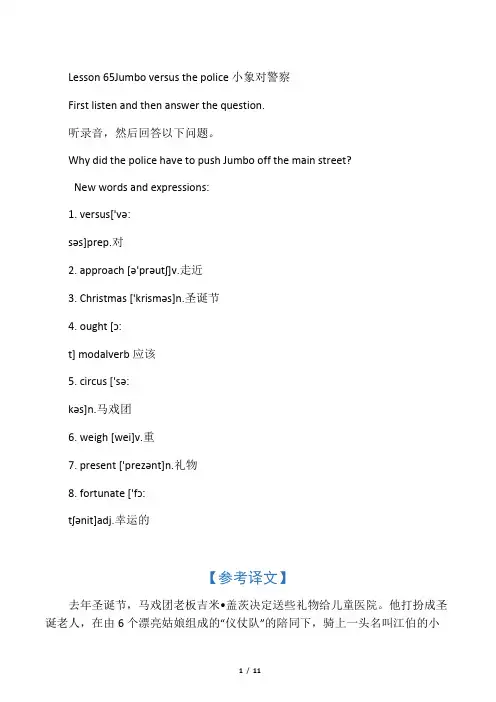
Lesson 65Jumbo versus the police小象对警察First listen and then answer the question.听录音,然后回答以下问题。
Why did the police have to push Jumbo off the main street?New words and expressions:1. versus['və:səs]prep.对2. approach [ə'prəutʃ]v.走近3. Christmas ['krisməs]n.圣诞节4. ought [ɔ:t] modalverb应该5. circus ['sə:kəs]n.马戏团6. weigh [wei]v.重7. present ['prezənt]n.礼物8. fortunate ['fɔ:tʃənit]adj.幸运的【参考译文】去年圣诞节,马戏团老板吉米•盖茨决定送些礼物给儿童医院。
他打扮成圣诞老人,在由6个漂亮姑娘组成的“仪仗队”的陪同下,骑上一头名叫江伯的小象,沿着城里的主要街道出发了。
他本该知道警察绝不会允许这类事情发生。
一个警察走过来告诉吉米,他应该走一条小路,因为江伯阻碍了交通。
虽然吉米同意马上就走,但江伯却拒绝移动。
15个警察不得不用很大的力气把它推离主要街道。
警察虽然吃了苦头,但他们还是感到很有趣。
“江伯一定有好几吨重,”一个警察事后这样说,“值得庆幸的是它没让我们抬它走。
当然,我们应该逮捕它,但由于它一贯表现很好,这次我们饶了它。
”【单词讲解】1. versus['və:səs]prep.对(1)(法律和运动用语,常略作v.或vs.)对;对抗Eg:The big match tonight is England versus Spain.今晚的大赛是英格兰对西班牙。
Robinson versus Brown鲁宾逊对布朗的诉讼(2)与...相对the problem of determinism versus freedom决定论与自由论相抗衡的问题2. approach [ə'prəutʃ]v.走近The old man approaches 80 years old.这个老人将近80岁了。
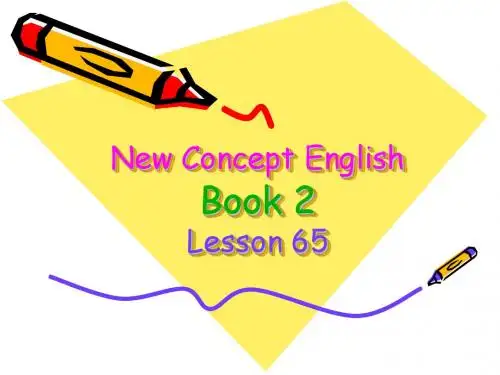
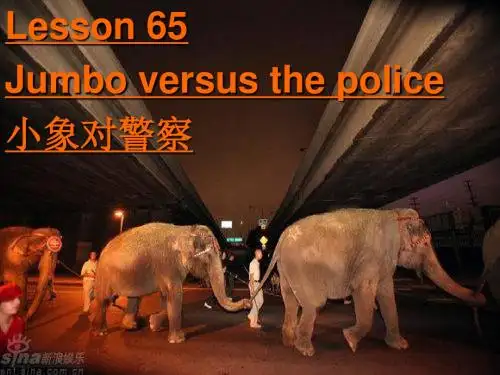
Lesson 6512-21-2013versus perp 对Christmas n 圣诞节circus n 马戏团present n 礼物accompany v 陪伴,随行approach v 走进ought verb 应该modal verb weigh v 重fortunate adj 幸运的versus 对(缩写 V/VS) 拉丁语China V(ersus) Brazil 中国队对巴西队China V(ersus) Turkey 中国队对土耳其队China V(ersus) Costa Rica 中国队对哥斯达黎加队Christmas n 圣诞节(亦写作Xmas )Christmas Day 圣诞节(当天)Christmas presents 圣诞礼物Christmas cars 圣诞贺卡Christmas trees 圣诞树Christmas Eve 平安夜(圣诞节前一天晚上)Eve 夏娃Father Xmas /Santa Claus 圣诞老人Merry Xmas 圣诞节快乐(祝福语)a white Christmas 有雪的圣诞节a green Christmas 无雪的圣诞节present 1n 礼物(gift)wedding presents 结婚礼物Christmas presents 圣诞礼物brithday presents 生日礼物2adj 出席的,在场的be present egegPresent! Sir.有!到!eg3adj prerent difficulties 现有的困难the present president 现任总统at the present moment 眼下,现在in the present case 就当前这件事情4n at present 在现在egI am free at present . 我现在有空。
the past, the present and the future 过去现在和将来5v 赠与 [prɪ'zənt]present sth to sb / present sb with sth 将某物赠与某人egPresent the sword to the heroes. 宝剑赠英雄。
裕兴新概念英语第二册笔记_第65课_课文讲解TextLast Christmas, the circus owner ,Jimmy Gates, decided to take some presents to a children`s hospatial.at the circus 在马戏团eg take … to 带到…去bring…from 从…带来①②accompanied 被陪同着,是个过去分词短语做伴随状语③riding 是现在分词短语作伴随状语④called Jumbo 被叫做Jumbo 的小象;called 是过去分词做定语修饰elephant主句是:he set off down the main street of the city 他沿着主干道出发了。
He set off 是主谓。
dress up 盛装,使盛装,打扮,使打扮eg We dressed up for the wedding. 我们盛装打扮去参加这个婚礼。
dress vt eg She dressed her baby. 她给她的婴儿穿衣服。
eg She dressed her doll. 她给她的洋娃娃穿衣服。
dress oneself in 穿着(表动作)eg be dressed in 正穿着(强调状态)eg The lady was dressed in white at the party.早派对上,那个女士穿着白衣服。
a guard of honor 仪仗队set off 出发set off down 沿着...出发(down 是介词,相当于along 的用法)set off alongset off for workset off on a trip 踏上旅途main street 主要街道,主干道the main dish 主菜the main character in 戏中的主角(jue)main purpose of the 这个方案的主要目的the main chance (口)(赚钱,赢利等的)机会,可能性have an eye to the main chance 仅考虑(着眼于)自己获利的机会He should have known that the police would never allow this sort of thing.should have done 本应该做…(实际上没有做)相当于 ought to have downshould have known 本该知道allow v eg I`ll naver allow such behavior. 我绝不允许这种行为的。
新概念英语二册Lesson 65 Jumbo versus the police 超详教案讲义笔记Lesson 65 Jumbo versus the police 小象对警察【New words and expressions】(9)versus prep. 对(对抗的概念)Christmas n. 圣诞节circus n. 马戏团present n. 礼物accompany v. 陪伴, 随行approach v. 走近ought modal verb. 应该weigh v. 重fortunate adj. 幸运的★versus prep. 对(对抗的概念)VS. ……对……(VS.是versus的缩写,读音不变,是拉丁语)eg. China VS Brazil 中国队对巴西队China VS Turkey 中国队对土耳其队★Christmas n. 圣诞节(亦写作Xmas)Christmas Day 圣诞节Christmas Eve 圣诞前夜Christmas presents 圣诞礼物Christmas cards 圣诞卡Christmas trees 圣诞树Father Christmas 圣诞老人Santa Claus 圣诞老人(米国常用)Merry Xmas 圣诞快乐a white Christmas 有雪圣诞节a green Christmas 无雪圣诞节★present n. 礼物(1)= gift 礼物eg. wedding presents 结婚礼物Christmas presents 圣诞礼物birthday presents 生日礼物(2)v. 赠予/pri’zent/eg. present sth. to sb. 将…赠予某人= present sb. with sth.Present the sword to the heroes. 宝剑赠英雄。
The winner was presented with the prize. 获胜的人被颁布了这个奖。
Lesson 65 Jumbo versus the policeversus prep. 对(缩写V/Vs)拉丁语China V(versus)Brazil 中国对巴西China V(versus)Turkey 中国对土耳其China V(versus)Cosat Rica 中国对哥斯达黎加Christmas n. 圣诞节(也写作Xmas)Christmas Day 圣诞节(那一天)Christmas cards 圣诞卡片Christmas tree 圣诞树Christmas Eve 平安夜Adam and Eve 亚当和夏娃Father Xmas / Santa Claus 圣诞老人Merry Xmas 圣诞快乐a white Christmas 有雪的圣诞节a green Christmas 无雪的圣诞节present1)礼物(gift)wedding presents 结婚礼物Christmas presents 圣诞礼物birthday presents 生日礼物2)adj. 出席的,在场的(be present)eg. Everyone present welcomed the decision. 在场的每个人都赞成这个决定。
(‘present’为adj. 作后置定语,修饰‘everyone’)。
eg. Present! sir. 有!到!(点名)eg. All are present and all is all right. 所有人都来了,一切正常。
3)adj. 现存的,现有的present difficulties 现有地困难present President 现任总统at the present moment 眼下,当前in the present case 就当前这件事情4)n. 当前,目前at present 现在eg. I’m free at present. 我现在有时间。
Lesson 65 Jumbo versus the police 小象对警察First listen and then answer the question.听录音,然后回答以下问题。
Why did the police have to push Jumbo off the main street?Last Christmas, the circus owner, Jimmy Gates, decided to take some presents to a children's hosp ital. Dressed up as Father Christmas and accompanied by a‘guard of honour’of six pretty girls, he set off down the main street of the city riding a baby elephant called Jumbo. He should have known that the police would never allow this sort of thing. A policeman approached Jimmy and told him he ought to have gone along a side street as Jumbo was holding up the traffic. Though Jimmy agreed to go at once, Jumbo refused to move. Fifteen policemen had to push very hard to get him off the main street. The police had adifficult time, but they were most amused .‘Jumbo must weigh a few tons,’said a policemen afterwards, ‘soit was fortunate that we didn't have to carry him. Of course, we should arrest him, but as he has a good record, we shall let him off this time.’New words and expressions:1. versus['və:səs]prep.对2. approach [ə'prəutʃ] v. 走近3. Christmas ['krisməs] n.圣诞节4. ought [ɔ:t] modal verb应该5. circus ['sə:kəs] n.马戏团6. weigh [wei] v.重7. present ['prezənt] n.礼物8. fortunate ['fɔ:tʃənit] adj.幸运的9. accompany [ə'kʌmpəni] v.陪伴,随行【参考译文】去年圣诞节,马戏团老板吉米•盖茨决定送些礼物给儿童医院。
lesson 65versus prep 对Christmas n 圣诞节circus n 马戏团present n 礼物accompany v 陪伴,随行approach v 走近ought modal verb应该weigh v 重fortunate adj 幸运的Christmas EveFather Christmas:圣诞老人Santa Claus:圣诞老人i'll accompany you to your hoteli'll accompany you homecome nearer and nearerthe old man approaches 80 years old approach sbhe is approaching meapproach n 途径,方法we have found an approach to success ought to do sthshould do sthshould:应该(我认为)ought to:应该(义务上)you shouldknock at the door 、管路敷设技术通过管线敷设技术,不仅可以解决吊顶层配置不规范问题,而且可保障各类管路习题到位。
在管路敷设过程中,要加强看护关于管路高中资料试卷连接管口处理高中资料试卷弯扁度固定盒位置保护层防腐跨接地线弯曲半径标高等,要求技术交底。
管线敷设技术中包含线槽、管架等多项方式,为解决高中语文电气课件中管壁薄、接口不严等问题,合理利用管线敷设技术。
线缆敷设原则:在分线盒处,当不同电压回路交叉时,应采用金属隔板进行隔开处理;同一线槽内,强电回路须同时切断习题电源,线缆敷设完毕,要进行检查和检测处理。
、电气课件中调试对全部高中资料试卷电气设备,在安装过程中以及安装结束后进行高中资料试卷调整试验;通电检查所有设备高中资料试卷相互作用与相互关系,根据生产工艺高中资料试卷要求,对电气设备进行空载与带负荷下高中资料试卷调控试验;对设备进行调整使其在正常工况下与过度工作下都可以正常工作;对于继电保护进行整核对定值,审核与校对图纸,编写复杂设备与装置高中资料试卷调试方案,编写重要设备高中资料试卷试验方案以及系统启动方案;对整套启动过程中高中资料试卷电气设备进行调试工作并且进行过关运行高中资料试卷技术指导。
Lesson 65 Jumbo versus the police 小象对警察First listen and then answer the question.听录音,然后回答以下问题。
Why did the police have to push Jumbo off the main street?Last Christmas, the circus owner, Jimmy Gates, decided to take some presents to a children's hospital. Dressed up as Father Christmas and accompanied by a…guard of honour‟of six pretty girls, he set off down the main street of the city riding a baby elephant called Jumbo. He should have known that the police would never allow this sort of thing. A policeman approached Jimmy and told him he ought to have gone along a side street as Jumbo was holding up the traffic. Though Jimmy agreed to go at once, Jumbo refused to move. Fifteen policemen had to push very hard to get him off the main street. The police had adifficult time, but they were most amused .…Jumbo must weigh a few tons,‟said a policemen afterwards, …soit was fortunate that we didn't have to carry him. Of course, we should arrest him, but as he has a good recor d, we shall let him off this time.‟New words and expressions:1. versus['və:səs]prep.对2. approach [ə'prəutʃ] v. 走近3. Christmas ['krisməs] n.圣诞节4. ought [ɔ:t] modal verb应该5. circus ['sə:kəs] n.马戏团6. weigh [wei] v.重7. present ['prezənt] n.礼物8. fortunate ['fɔ:tʃənit] adj.幸运的9. accompany [ə'kʌmpəni] v.陪伴,随行【参考译文】去年圣诞节,马戏团老板吉米•盖茨决定送些礼物给儿童医院。
他打扮成圣诞老人,在由6个漂亮姑娘组成的“仪仗队”的陪同下,骑上一头名叫江伯的小象,沿着城里的主要街道出发了。
他本该知道警察绝不会允许这类事情发生。
一个警察走过来告诉吉米,他应该走一条小路,因为江伯阻碍了交通。
虽然吉米同意马上就走,但江伯却拒绝移动。
15个警察不得不用很大的力气把它推离主要街道。
警察虽然吃了苦头,但他们还是感到很有趣。
“江伯一定有好几吨重,”一个警察事后这样说,“值得庆幸的是它没让我们抬它走。
当然,我们应该逮捕它,但由于它一贯表现很好,这次我们饶了它。
”【单词讲解】1. versus['və:səs]prep.对(1)(法律和运动用语,常略作v.或vs.)对;对抗Eg:The big match tonight is England versus Spain. 今晚的大赛是英格兰对西班牙。
Robinson versus Brown鲁宾逊对布朗的诉讼(2)与...相对the problem of determinism versus freedom 决定论与自由论相抗衡的问题2. approach [ə'prəutʃ] v. 走近(1)接近,靠近come nearer and nearerThe old man approaches 80 years old.这个老人将近80岁了。
He cautiously approached the house. 他小心地走近那房子。
approach sbEg:He is approaching me.他正向我逼近。
(2)着手处理,开始对付He approached the question as a scientist. 他从科学家的角度来处理这一问题。
(3)途径,方法,方式;态度[C][(+to)]I like her approach to the problem. 我喜欢她解决这个问题的方法。
we have found an approach to success.3. Christmas ['krisməs] n.圣诞节[扩展] 欧美国家的节日:April Fool's DayThanksgiving DayChristmas Eve 圣诞前夕(12月24日)Father Christmas:圣诞老人Santa Claus:圣诞老人4. ought [ɔ:t] modal verb应该(1)(表示义务、责任等)应当,应该Students ought to study hard. 学生应该努力用功。
(2)(表示愿望)应该,该You ought to read his novels. 你应该读读他的小说。
(3)(表示可能性、期望)该It ought to be a fine day tomorrow. 明天该是好天气。
(4)区别ought to do sth和should do sthshould:应该(我认为)ought to:应该(义务上)You shouldknock at the door.You ought to knock at the door.5. circus ['sə:kəs] n.马戏团(1)[C]马戏团(2)the circus【单数】马戏表演(常在大帐篷里进行Eg:The children were spellbound by the circus performance. 孩子们被马戏表演迷住了。
6. weigh [wei] v.重(1)v.称...的重量,掂估...的分量He weighed the parcel by hand. 他用手估量那个包裹的重量。
(2)vt.考虑;权衡[(+against)]They weighed the advantages and disadvantages before making the decision.他们权衡利弊之后才作出决定。
(3)v.有...重量;称起来[L]How much do you weigh? 你体重多少?sb+weigh+体重(4)weight n.重,重量;体重[C][U]What is your weight? 你体重多少?lose weight 减肥7. present ['prezənt] n.礼物(1)adj.出席的,在场的[F]How many people were present at the meeting? 到会的有多少人?(2)现在的,当前的[B]I'm not at all satisfied with the present situation. 我对目前的情况一点都不满意。
留在记忆里的,不能忘记的[F][+in/to](3)名词n现在,目前[the S]There is no time like the present. 机不可失,时不再来。
(4)名词n.礼物,赠品[C]He often gave his neighbor's kids little presents. 他常常送些小礼物给邻居的孩子。
8. fortunate ['fɔ:tʃənit] adj.幸运的(1)幸运的,侥幸的[+to-v][(+in)][+that]It is fortunate that we can all meet tomorrow. 我们明天都能见面了,真是幸运。
He's fortunate in having a good job. 他真幸运,有份好工作。
I feel fortunate to have met them. 我觉得很幸运能见到他们。
(2)带来幸运的He came at a very fortunate time. 他来得恰是时候。
That is a fortunate start. 那是个良好的开端。
lucky:有运气的,幸运的9. accompany [ə'kʌmpəni] v.陪伴,随行(1)vt. 陪同,伴随He wished her to accompany him. 他希望她陪他。
I'll accompany you to your hotel.I'll accompany you home.(2)vt.随着...发生,伴有Lightning usually accompanies thunder. 电闪通常伴着雷声。
(3)使附有[O]He accompanied his speech with gestures. 他演讲时附带做着手势。
(4)为...伴奏,为...伴唱The pianist accompanied her singing. 钢琴家为她的歌唱伴奏。
Her mother accompanied her on the piano. 她的母亲为她作钢琴伴奏。
【课文讲解】1. Last Christmas, the circus owner, Jimmy Gates, decided to take some presents to a children's hospital.take to:把...送到2. Dressed up as Father Christmas and accompanied by a guard of honour of six pretty girls,dress up as:打扮成为dress up:打扮be dressed3. he set off down the main street of the city riding a baby elephant called Jumbo.a guard of honour:仪仗队set off:出发riding是状语4. He should have known that the police would never allow this sort of thing.should have done:原本应该做而没做needn't have done:过去不必做但是做了5. A policeman approached Jimmy and told him he ought to have gone along a side street as Jumbo was holding up thetraffic.(1)ought to:应该should(应该)/ought to(应该)/have tohave to:不得不ought to:应该(强调义务)must表示推测should应该(含有建议)(2)所有的情态动词+have done都跟过去有关①跟虚拟语气有关的:would have done②表示推测句型:may/must/can't have done③should have done:原本该做但是没做④needn't have done:原本不必做但是做了(3)as=because(4)hold up the traffic:阻碍交通6. Though Jimmy agreed to go at once, Jumbo refused to move.though尽管agree to do:同意做某事agree with sbagree to (prep)sthI agree with youI agree to your advice.I agree to go with you.7. Fifteen policemen had to push very hard to get him off the main street.off=away from离开什么地方8. The police had adifficult time, but they were most amused .…Jumbo must weigh a few tons,‟said a policemen afterwards, must+v推测:have to:不得不afterwards=later后来9. …so it was fortunate that we didn't have to c arry him.It was fortunate that...幸运的是……carry:抬起来10. Of course, we should arrest him, but as he has a good record, we shall let him off this time.‟(1)should跟现在有关系should have done跟过去有关系(2)let sb off(go):让某人走(离开)record:(警察局的)记录set up a new world recordsb have a good record【Special Difficulty】as,like,seem像……(1)as后面要加句子,只有在the same as结构时不加句子,或者是as...asLucy is the same as her sister。